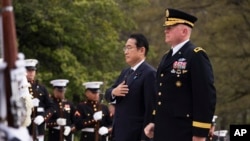U.S. President Joe Biden will welcome Japanese Prime Minister Fumio Kishida to the White House on Wednesday for an official visit that will mark one of the biggest structural upgrades to the U.S.-Japan security alliance in decades. The visit will also promote further integration of Tokyo and other allies in the region into Washington’s security framework, a key factor in deterring Beijing.
Biden and Kishida will announce measures that will, for the first time, allow the United States and Japan to cooperate more closely on the development and potential co-production of important military and defense equipment, Deputy Secretary of State Kurt Campbell said at a recent event hosted by the Center for a New American Security.
It’s a milestone in the U.S.-Japan alliance, which Campbell described as “a cornerstone of our engagement in the Indo-Pacific.”
The two leaders will also announce their intention to modernize a framework that has guided interactions between the Japan Self-Defense Forces and the approximately 54,000 U.S. troops stationed in Japan for decades.
Tokyo hopes that the US military will strengthen the functions of its command headquarters in Japan for better coordination. Under the current system, major decisions are coordinated with U.S. Indo-Pacific Command in Hawaii, more than 6,000 kilometers (3,728 miles) and five time zones away.
Tetsuo Kotani, a senior researcher at the Japan Institute of International Affairs, said that under the new national security strategy, Japan is establishing a joint combat command for its Self-Defense Forces.
“In this sense, we have done our homework and now is the time for the United States to upgrade its command and control structure in the Indo-Pacific region,” he told VOA.
wider regional framework
The leaders agreed on the goal of expanding bilateral security ties into a broader regional framework with other U.S. allies, including the Philippines and Australia.
Later this week, Philippine President Ferdinand Marcos Jr. will join the two men at a summit to strengthen trilateral maritime cooperation in the South China Sea. An announcement of some form of trilateral joint naval patrols is widely expected.
In addition to bolstering its naval defenses as Beijing steps up its aggression in the South China Sea, Tokyo has expressed a desire to integrate Japan into a broader integrated air and missile defense network with the United States and Australia.
“Promoting cooperation with like-minded countries on security, including defense equipment and technology, will lead to the establishment of a multi-layered network, and by expanding this network, we can improve deterrence,” Kishida said on Friday.
Given the difficulty of integrating such systems, negotiations are likely to begin among the three countries, said Jeffrey Hornung, Japan director of RAND’s national security research group and a senior political scientist at the RAND Corporation. Establish greater situational awareness of their respective air and missile defense systems. .
“Any cooperation in this area will help weaken China’s anti-access and area denial efforts and allow these three countries to convey information about China’s activities,” he told VOA.
Biden and Kishida will also discuss Japan’s potential participation in AUKUS, the trilateral security partnership established in 2021 by the United States, Australia and the United Kingdom.
“Recognizing Japan’s strengths and its close bilateral defense partnerships with these three countries, we are considering cooperation with Japan on the AUKUS Pillar 2 Advanced Capabilities Project,” The group said in a joint statement Published by the British Government.
AUKUS’ “second pillar” focuses on delivering advanced capabilities and shared technologies in a range of areas including quantum computing, undersea, hypersonics, artificial intelligence and cyber technologies. The move takes the organization’s efforts beyond its first pillar – providing nuclear-powered attack submarines to Australia, for which there are currently no known plans to include Japan.
Yuki Tatsumi, director of the Stimson Center’s Japan program, said any cross-border defense industry partnership is an extremely complex undertaking.
She told VOA that harmonization is needed on many fronts, from industrial safety standards to export licensing regulations to intellectual property arrangements. “To make it a reality, it will take months of careful consultations between the four countries.”
Nippon Steel
Potential differences remain between Biden and Kishida over a proposed sale of Pittsburgh-based U.S. Steel Corp. to Japan’s Nippon Steel Corp., a deal that has become embroiled in protectionist campaign rhetoric ahead of the November U.S. presidential election.
Last month, Biden announced his opposition to the deal, saying the U.S. needed to “maintain strong U.S. steel companies driven by American steelworkers.” His potential opponent, former President Donald Trump, has pledged to block the $14 billion deal if he is re-elected.
Tatsumi said the sight of a Japanese company trying to acquire an American manufacturing company in an election year was not good for Biden, and the two wanted to avoid airing their differences publicly.
At an event hosted by the Center for Strategic and International Studies on Tuesday, U.S. Ambassador to Japan Rahm Emanuel sought to downplay the impact of Biden’s opposition to the U.S. Steel acquisition on relations between the two countries.
He noted that the Biden administration in February approved a plan that would generate billions of dollars in revenue for a U.S. unit of Japan’s Mitsui Corp. to produce cranes in the United States.
Kishida and Japan’s first lady Yuko Kishida will be briefly welcomed to the White House on Tuesday night before an official visit and formal state dinner on Wednesday, the fifth hosted by Biden since taking office in 2021.
VOA’s William Gallo contributed to this report.
Follow us on Google news ,Twitter , and Join Whatsapp Group of thelocalreport.in
